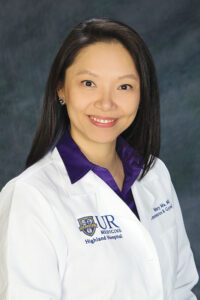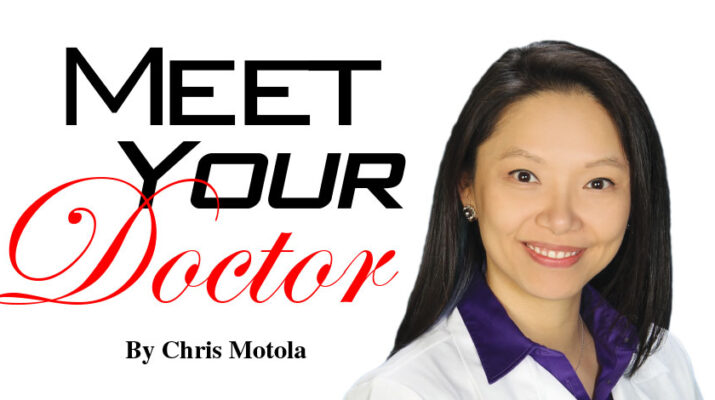New Highland Hospital chief of OB-GYN wants to address inequalities in maternity care and disparate maternal outcomes based on race and ethnicity
By Chris Motola

Q: Can you tell us a little about the path you took to becoming the new chief of OB-GYN at Highland Hospital?
A: I joined the faculty here in 2016 and have been at Highland this whole time. In 2019 I took on the role of the division director for Highland Women’s Health. And then last summer I took on the role of interim chief of OB-GYN. And just this past month I’m no longer interim, but official chief of OB-GYN here at Highland.
Q: How do you divide your time between administration and practice?
A: It is a hard balance because of course the position comes with a lot of administrative responsibility, but at the end of the day our job is to take care of patients as a clinician. It’s a hard split because you have to keep your skills sharp for patient care, so it’s a matter of fitting it in where you can for both responsibilities.
Q: You’ve been educated in both Canada and Ireland, so I’m guessing you had some exposure to other systems. How does that inform your practice and position?
A: With Canada, most of that was my pre-university education so I didn’t have exposure to the healthcare system beyond what I experienced just living there. My medical school was in Ireland and its system has some components that are similar to Canada’s and some that are similar to the U.S. It has components of a public healthcare system as well as components of a private healthcare sector. In terms of comparison, it’s pretty difficult to directly compare due to the scales of the system. Ireland’s a much smaller country, and America is very different in regards to available resources. But it did give me an appreciation for just how diverse and different healthcare systems can be, and in how to navigate these different systems.
Q: What are some of the areas do you think Highland can improve upon when it comes to OB-GYN care?
A: One thing that is very much a local conversation, a regional conversation and a national conversation is addressing inequalities in maternity care and disparate maternal outcomes based on race and ethnicity. And I think that’s a conversation we need to keep having to make sure that we’re ensuring good care to all of our patients.
Q: What are some of the stumbling blocks that create those disparate outcomes that you are in a position to address?
A: I think it’s multi-fold. Access to care is a component of this, whether it’s being able to get to appointments, whether the patients have infrastructure around them to be able to attend care. It’s also a matter of whether the patients feel they can trust the system and the recommendations given to them, as well as willingness to engage with the system and providers. I think we’d be remiss if we didn’t talk about systemic racism in this country and how it impacts outcomes. I think it’s up to us to engage our patients as best we can and meet them where they are.
Q: At the level of the hospital, what do you think can be done to address systemic racism?
A: I think being flexible in terms of how patients access care. So during COVID we’ve had a lot of restrictions on visitors in the office, but for patients without a lot of social supports may not, for example, be able to come to an appointment without bringing their children along. So being able to address their particular needs while also keeping our patients and staff safe is important. But we need to be willing to engage in ways that allow their unique needs to be addressed.
Q: Has COVID-19 made it harder to address these concerns?
A: COVID’s impact has been so wide-reaching. Its impact on care is not just restricted to our patients with difficulties with social supports. With schools being affected, with lockdowns, with changes in healthcare availability, patients with fewer resources and supports are often more affected. With the initial lockdowns, a lot of people’s care was put on hold if it wasn’t considered essential. A lot of appointments were postponed, so we’re playing catch-up. We also are trying to reassure patients that we’re in a different place; we have more understanding about how COVID is transmitted. We have masking everywhere. We know how to screen for symptoms. So any care that patients have been putting off, it’s probably worth reaching out to their providers now.
Q: Is there anything you’re doing to incentivize patients to come back?
A: I think the best we can do is reassure patients that we’re taking safety as seriously as they are. All employees are masked, everyone who comes is screened for symptoms, we have rigorous cleaning protocols between patients, we have hand sanitizer everywhere. We want patients to know we’re taking all possible measures to keep everyone safe while they’re getting their care.
Q: What additional impacts would you like to have on your program?
A: A lot of our surgeries were canceled in the beginning of the pandemic. Anything that was medically urgent still went ahead, but many issues that weren’t life-threatening but still impacted quality of life were delayed. So that was a big impact on our gynecology department, and we’d like to catch up with all of that.
Q: Does your practice lean more toward obstetrics or gynecology?
A: I’m a healthy mix of both. I’m a generalist, so I deliver babies, I see patients in the office, and I operate. I get to do a little bit of everything, which is wonderful.
Lifelines
Name: Mary Ma, M.D.
Position: Chief of obstetrics and gynecology at Highland Hospital
Hometown: Richmond Hill, Ontario
Education: Medical degree from Royal College of Surgeons, Ireland; residency in OB-GYN at University of Vermont
Affiliations: Highland Hospital
Organizations: American Board of Obstetrics and Gynecology, American College of Obstetrics and Gynecologists
Highlights: Assistant professor in obstetrics and gynecology at the University of Rochester Medical Center since 2016; Recognition of excellence in minimally invasive gynecology, 2016
Family: Husband, daughter
Hobbies: Snowboarding, time with family

